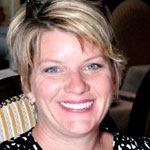By Bob Allen
The Alliance of Baptists had to scramble to find a venue for its Sept. 18-20 conference on waging peace and justice in the Holy Land when the host church withdrew its invitation the day before the meeting.
Paula Dempsey, the Alliance’s director of partnership relations, said in an email newsletter Sept. 29 that “no one was more surprised than me” when after months of planning, the pastor of Wake Forest Baptist Church in Winston-Salem, N.C., cancelled at the last minute.
This year’s gathering, the third sponsored by the Alliance’s Community for Justice in Palestine and Israel, focused on discussion of the Boycott, Divestment and Sanctions movement, a hot topic on U.S. campuses which pro-Israel groups view as a threat to Israel’s economic survival.
 Lia Scholl, pastor of Wake Forest Baptist Church, said in a letter to church members that she was concerned that holding the event at the church located on the campus of Wake Forest University inadvertently put the university in a position to take responsibility for a controversy it had no part in creating.
Lia Scholl, pastor of Wake Forest Baptist Church, said in a letter to church members that she was concerned that holding the event at the church located on the campus of Wake Forest University inadvertently put the university in a position to take responsibility for a controversy it had no part in creating.
“I made the decision for a variety of reasons, but the most compelling one was the difficulty of having conversations about BDS (or the Israeli and Palestinian conflict) on a college campus,” Scholl said. “On this particular topic, there is a fine line between inflammatory speech and healthy dialogue.”
G.J. Tarazi, a leader of the Community for Justice in Palestine and Israel and member at Ravensworth Baptist Church in Annandale, Va., said withdrawal of the invitation “effectively deprived us of our free speech rights on campus.”
“We refused to have our free speech taken from us,” Tarazi said, and moved the Friday and Saturday sessions to the Old Salem Visitor Center and Parkway United Church of Christ.
Dempsey said some were disturbed by the last minute changes for the event and felt that the voice of the Palestinians was stifled.
Tarazi viewed the gathering on campus as a causality of pressure from pro-Israel voices. “I believe our need to move had little to do with our friends at Wake Forest Baptist Church,” he said. “It had everything to do with those who oppose BDS.”
He said the same thing happened at Colgate Rochester Crozer Divinity School, when a veteran social and economic justice activist and outspoken supporter of Palestinian human rights was disinvited just days before a speech he was scheduled to give.
That speaker, Graylan Hagler, senior minister of Plymouth Congregational United Church of Christ in Washington, said he received death threats from individuals identifying themselves as members of Christians United for Israel, an evangelical Zionist organization founded by San Antonio pastor John Hagee.
Scholl denied that the university bullied or coerced her to cancel the meeting. “In fact, they didn’t even suggest it,” she said.
Scholl, who began as pastor of Wake Forest Baptist Church last year, said the incident has prompted thinking about the autonomy of the congregation that meets in Wait Chapel and was organized in 1956 when Wake Forest College moved to Winston-Salem from what now is Southeastern Baptist Theological Seminary in Wake Forest, N.C.
“In all honesty, I’ve always thought about the concept of an autonomous church as meaning that we can make our own decisions — which I suppose is true,” she said. “But the truth is we live in a community, and we face the consequences of those decisions. So we are free to do anything we decide to do as a body of Christ. And there will always be consequences.”
“We exist within the community of Wake Forest University,” Scholl said. “My goal in moving the conference was to honor and protect our community. I did not properly appreciate how difficult it would be to constructively balance competing positions about oppression and racism, and I had not communicated clearly and completely with the university about our hosting this difficult conversation. I inadvertently put the university in a position to take responsibility for our actions.”
